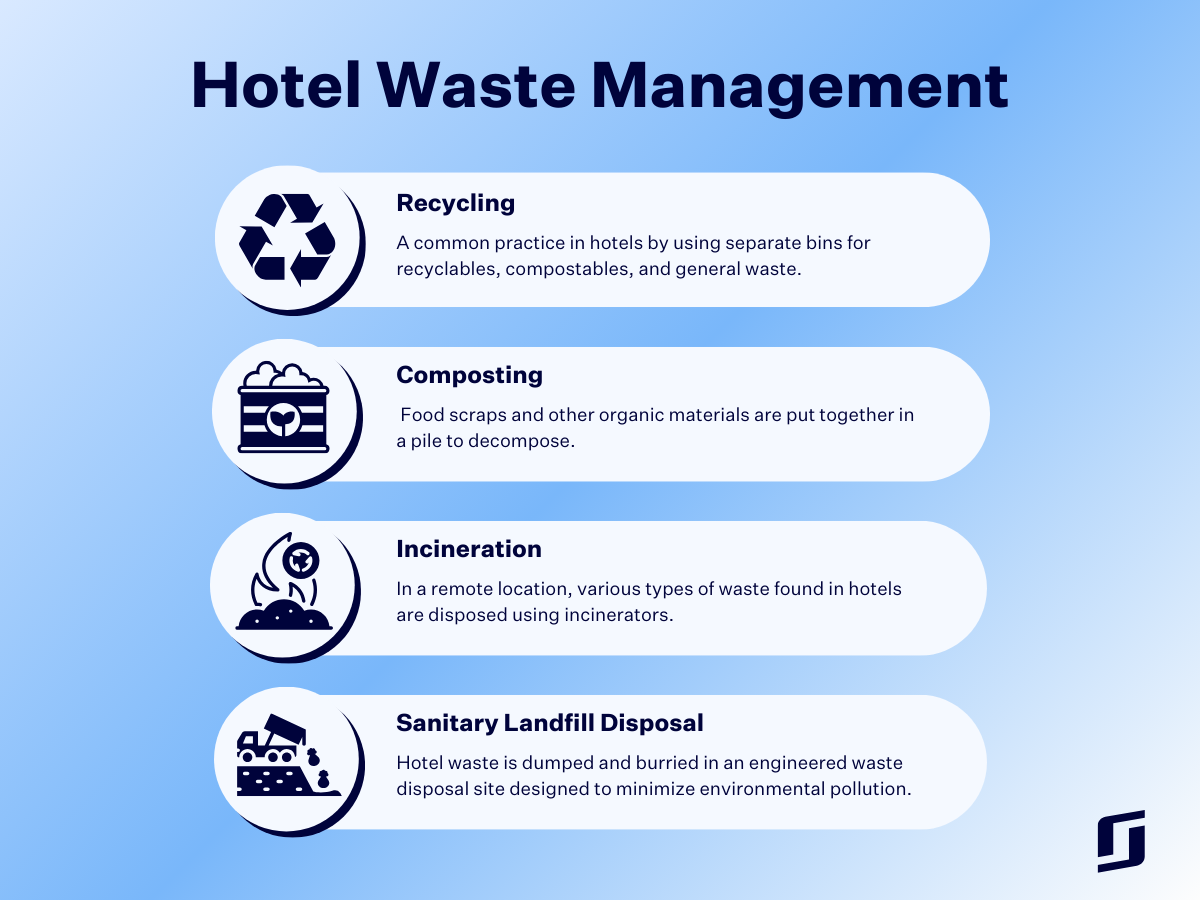What is hotel waste management?
Hotel waste management refers to the strategies and processes hotels implement to properly handle and dispose of all the different types of waste generated on their properties in an environmentally friendly way.
The key is finding smart ways to reduce, reuse and recycle as much of that waste stream as possible while ensuring any remaining rubbish gets disposed of responsibly according to regulations. Doing it right means thinking green across all hotel operations to minimise your environmental impact.
This blog will give you a full guide to managing waste at your hotel and keep your business running smoothly.
Table of contents
Why is hotel waste management important?
Hotel waste management is a priority for a few major reasons.
First off, hotels produce a lot of waste from guests and operations – such as food scraps, plastics, papers, even hazardous materials like cleaning chemicals and batteries. Having solid management practices in place helps cut way down on what gets sent to landfills, reducing the hotel’s environmental impact. It also keeps you compliant with any local laws around proper disposal, avoiding hefty fines down the line.
However, it’s not just about following rules – more and more guests want an eco-friendly experience, so demonstrating sustainability through effective waste practices boosts your reputation and guest satisfaction. On the operations side, maximising recycling, composting and reusing materials wherever possible makes your hotel more efficient and can seriously cut costs over time. Plus, getting staff involved creates a culture of environmental responsibility that’s great for morale.
So in the end, prioritising hotel waste management is a win for the planet, your guests’ perceptions, regulatory compliance, and your bottom line.
Boost your hotel’s efficiency with SiteMinder’s platform
With smart analytics, automation, and third party integrations, our hotel platform helps you improve your efficiency, optimise your time, and boost revenue.
Learn more
What are the causes of waste in hotels?
Research shows that food waste is shaping up to be a strong concern of guests with consumers claiming that it bothers them almost as much as food prices.
And for hoteliers that generate waste, it can be an expensive and complex business when it comes to disposing of things like trash and leftover food.
For example, one in every six meals in the UK is wasted and on average a restaurant wastes 22 tonnes of food per year.
Disposing of waste is also a costly job with hotels having to pay a waste tax which in the UK is currently set at £82.60 per tonne. That’s a staggering £2,000 per year spent on simply sending waste to landfill.
The common causes of waste in hotels are:
- Overstocking supplies: Hotels often stock up on items like toiletries, linens, and cleaning products in excess to avoid shortages. However, this practice can lead to waste if the supplies expire or become obsolete before they are used.
- Food preparation waste: The process of preparing meals in hotel kitchens can generate a significant amount of waste, such as trimmings, peelings, and spoiled or expired ingredients.
- Customer plate waste: Guests at hotel restaurants and buffets may leave behind uneaten portions of their meals, contributing to food waste.
- Outdated equipment: As hotels upgrade their facilities and equipment, outdated items like furniture, appliances, and electronics may end up in landfills if not properly recycled or donated.
- Poor staff training: Lack of proper training for hotel staff on waste management practices, such as recycling and composting, can result in increased waste generation and improper disposal.
- Menu changes: When hotels update their restaurant menus, they may discard unused ingredients and packaging from the previous menu items, leading to waste.
- Lack of recycling programs: Without comprehensive recycling programs in place, hotels may dispose of recyclable materials like paper, plastic, glass, and aluminium in the general waste stream, contributing to higher waste volumes.
There are many different ways that hotels generate waste – which means there are equally as many opportunities for reducing, reusing, and recycling. It simply requires the right waste management strategy.

How do you manage hotel waste?
Cutting down on hotel waste doesn’t have to be a chore – in fact, there are plenty of creative solutions that don’t require significant upfront investment, and offer significant, immediate impacts on waste.
Here are 10 innovative ways your hotel can save waste – and money!
- Speak to your suppliers about unnecessary packaging to manage your hotel’s solid waste.
- Factor waste into menu planning
- Consider donating food surplus to better manage hotel food waste.
- Use a food waste smart metre
- Have a compostable bin in an easily accessible place
- Promote doggie bags (leftovers to take away) to guests
- Use refillable glass bottles rather than plastic
- Offer various portion sizes such as entree and main
- Ensure proper storage techniques
- Reduce collection fee by managing large amounts of separated waste
How to deal with misconceptions about hotel kitchen waste
You know you’re in control of your hotel’s kitchen and you also understand your food purchase costs and where that money goes. But did you know that food waste counts for a significant 15% of those costs?
Here are the top misconceptions that might resonate with you and your hotel staff:
“Food waste doesn’t cost me that much money”
Making small changes to the way tasks are handled in your kitchen can deliver considerable savings. The ‘Waste Not, Want Not’ report suggests recording and tracking your kitchen waste in a logbook, app or smart meter adding the reasons why that food is being wasted. By figuring out the gaps in your processes, you can identify where to save on your food costs.
“We don’t produce food waste”
Every hotel kitchen has an “optimal level of waste”. It includes everything from spoilage and cooking errors to inventory damage and customer plate waste. Rather than spreading food waste out across many places, centralise your bins so staff can get a true sense of how much is being wasted. Visual impacts often work really well.
“Plate waste is an issue out of our hands”
The BHA suggests that hotel kitchen staff should see food waste as time and resources wasted. You should make the effort to track how much plate waste is occurring day-to-day and use it to establish your optimal portion size. Savings from oversized food portions can then be directed elsewhere.
“Food waste is inevitable when we need to display full dishes so the buffet stations never look empty”
This is a massive challenge here largely because of the importance for buffet stations to look appealing and appetising. Brainstorming ways to reduce waste at high volume service times can be tricky. One suggestion from the report is to place higher value items in smaller dishes in order to refill them less often.
“Food waste is unavoidable”
There are two different camps when it comes to food waste – the avoidable and unavoidable. Trimmings, peelings, and things like coffee grounds are unavoidable as they are usually wasted during food prep. Avoidable waste comes from a lack of efficiency and control. And you should focus on the areas within that control. Keeping a tight hold on your stock control and production processes are key.
“Tracking food waste takes too much time”
Finding cost savings in any department in your hotel will take time. But tracking food waste is the best way to establish how to cut back on waste in exchange for a small amount of effort. Use separate bins for food preparation, spoilage, and plate leftovers and measure them. You could even weigh them. There are companies available that can help you measure and track food waste and industry associations like the BHA can point you in the right direction.
“Our recycling doesn’t really get recycled”
What happens to recycling when it’s sent away to be recycled? Out of sight, out of mind applies here and some of your hotel staff might be cynical when it comes to the outcome of your efforts to tackle waste. The guide offers summaries for the various types of recycling. For example, glass, which is re-melted into new jars and bottles. Every 1,000 tonnes of recycled glass that is used in this way saves 345,000 kWh of energy, 314 tonnes of CO2, 1,200 tonnes of raw material and 1,000 tonnes of landfill. Over 80% of the glass collected for recycling is used in the UK to make new glass bottles and jars.
“Food waste collections are expensive”
This, according to the BHA guide, was often the case but things have changed and the price of food waste collections have fallen significantly with an upswing on the cost of collecting heavier general waste. You should chat to your food waste management company regularly about making cost savings.
“A bin full of food waste will be smelly”
It’s fair that you don’t want unpleasant odours in your hotel’s kitchen from food waste that’s been hanging around too long. Discuss having more frequent collections and use lids to keep your working environment free of smells.
“I don’t have space for another bin for food waste”
Space can be at a premium in your hotel’s kitchen and the guide advises that food waste is denser than general waste and so requires smaller bins. There are plenty of creative options available if you’re stuck for space such as stacked bins that use vertical space.
What is an example of waste management in the hospitality industry?
Waste management in hotels is a broad challenge, and every hotel will have its own areas of greatest opportunity. However, rather than seeing this as a daunting challenge, instead see it as a chance to get ahead of the competition – many of which will be falling behind while you push ahead.
Thankfully, help is available in the form of a new guide from The British Hospitality Association (BHA), and waste experts SWR and Winnow, which has advice for hotels looking to reduce waste and save extra money.
The BHA report suggests that hoteliers should first develop a plan based around the actions ‘research, act, and reduce’.
Start by researching your waste management costs and contracts and speak to your current waste management company. It’s a great place to begin and they can advise you on how to improve your existing procedures in order to reduce costs. You should also learn how to measure and monitor waste and then set goals to reduce it down.
The guide from the BHA, SWR, and Winnow features two practical case studies – one from London restaurant Sam’s Brasserie & Bar, and the other from hotel group Macdonald Hotels.
Hotel waste management example 1
Sam’s Brasserie & Bar already has a solid reputation for sustainability and a near best-in-class kitchen efficiency, with only 110g of waste per cover, a fraction of the waste generated at other restaurants.
Looking to boost its credentials further, the restaurant began using a food waste smart meter from Winnow, and over four weeks reduced its waste by 30% – a saving of £5,000 in food costs. The business also prevented sending 1.3 tonnes of waste to landfill by following the advice laid out in the top 10 above.
Hotel waste management example 2
Macdonald Hotels, another actively sustainable business in the UK, sought a new waste management supplier as the hotel group had no way of benchmarking or measuring the recycling performance of their hotels – something that is central to its strategy. However looking for a new supplier created a second set of issues in that all its hotels are unique with differing local issues such as rural locations.
Disruption caused by changing suppliers was a real concern for the group. But SWR mapped a picture of opportunities for the hotels and the outcome was a plan to deal with multiple waste streams across multiple sites – giving Macdonald Hotels confidence in a new end-to-end waste management service.

